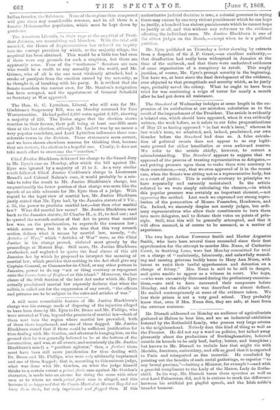A still more remarkable feature of Mr. Justice Blackburn's charge
was his strange mode of disposing of the, injustice alleged to have been done by Mr. Eyre to Dr. Bruce and Mr. Phillips, who were arrested at Vere, beyond the precincts of martial law—both of them sent into the region where martial law prevailed, both of them there imprisoned, and one of them flogged. Mr. Justice Blackburn stated that if there could be sufficient justification for thus dealing with Mr. Gordon, and afterwards banging him, on the ground that he was generally believed to be at the bottom of the insurrection, and was, at all events, and notoriously (in Mr. Justice Blackburn's mind) a " pestilent agitator," then, a fortiori there must have been still more justification for thus dealing with Dr. Bruce and Mr. Phillips, who were only arbitrarily imprisoned and one of them flogged ; that is, according to this eminent judge, what was done with Mr. Gordon, on what the judge himself thinks to a certain extent a prinui facie case against Mr. Cordon's character, is made into an excuse for doing the same with other men as to whom no such prima facie case is alleged, and this because it so happened that the Court-Martial at Morant Bay did not hang them there, but only imprisoned and flogged them. If this authoritative judicial doctrine is tree, a colonial governor in trying times may excuse by one very violent punishment which he can hope to jttstify, a hundred less violent punishments which he cannot hope to justify at all, and this without any reference to the evidence affecting the individual eases. Mr. Justice Blackburn is one of the ablest judges on the Bench,—except when he is a political


































 Previous page
Previous page